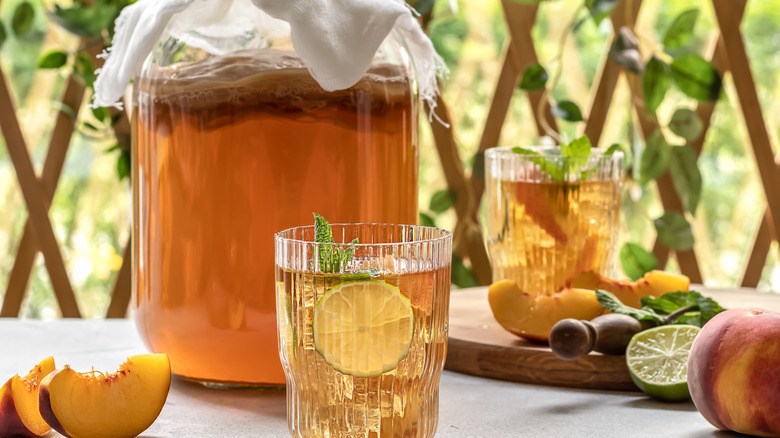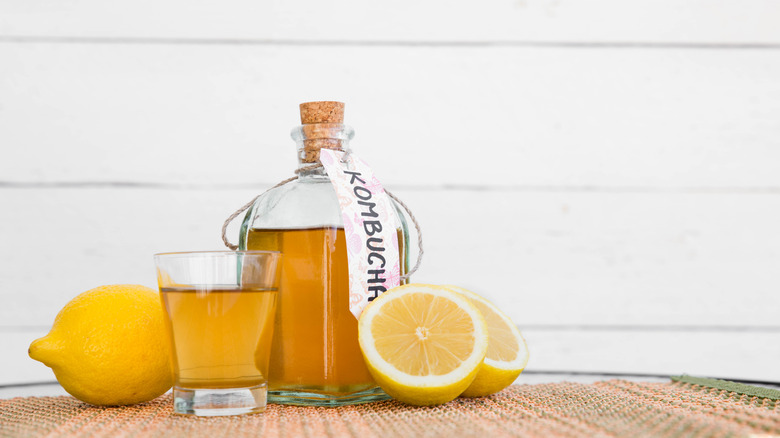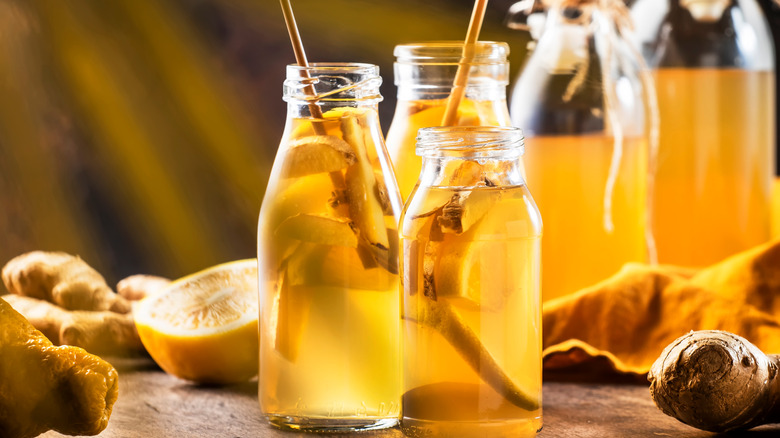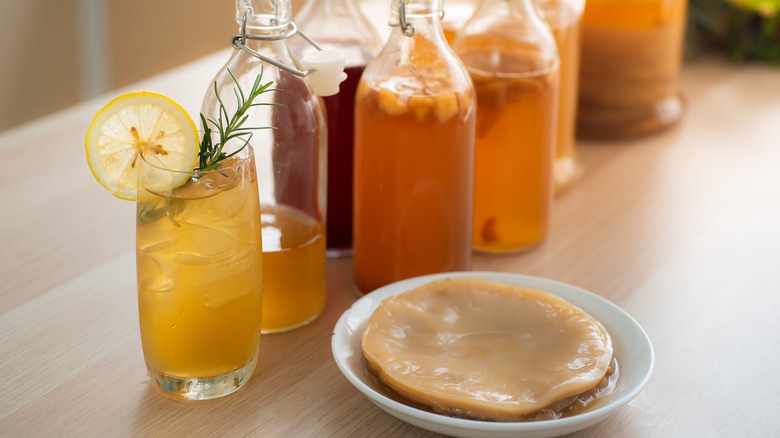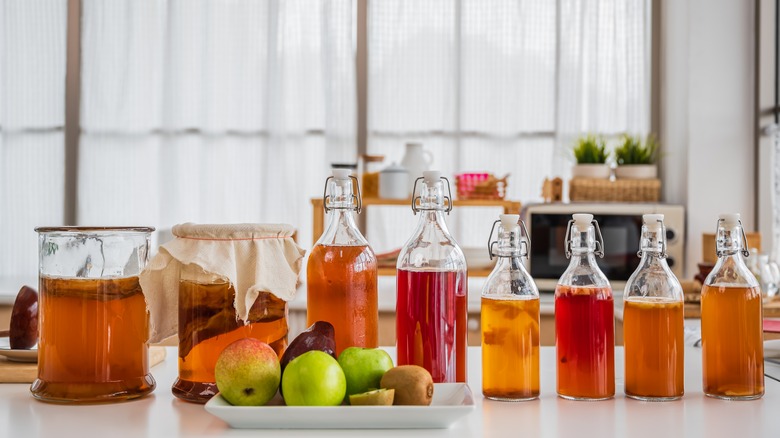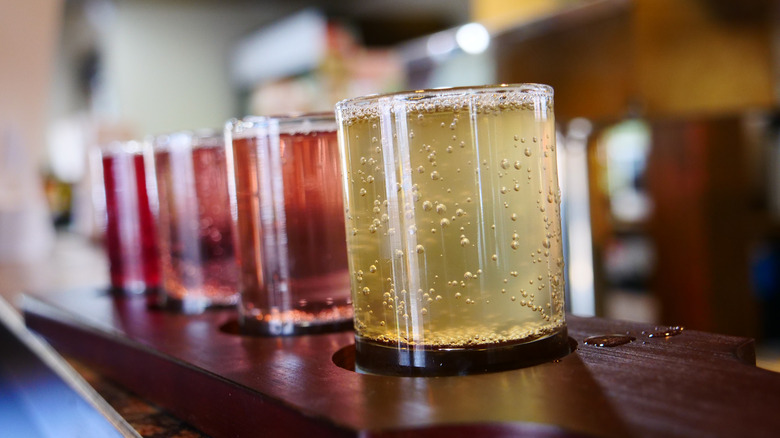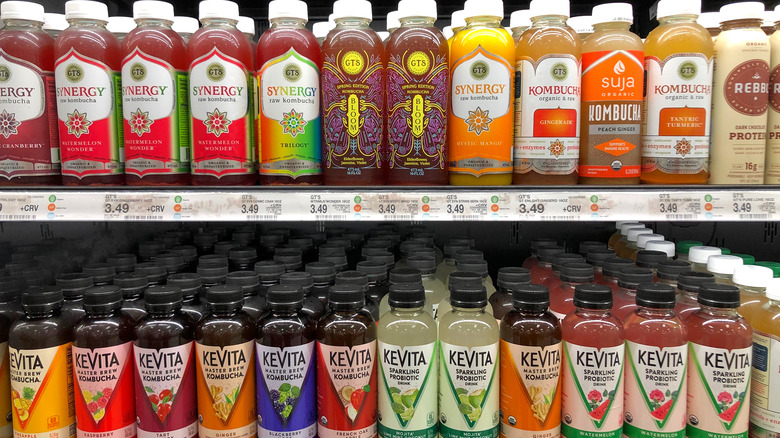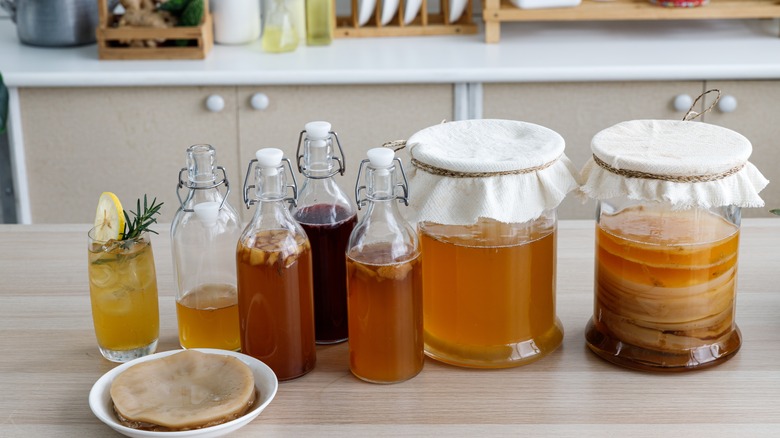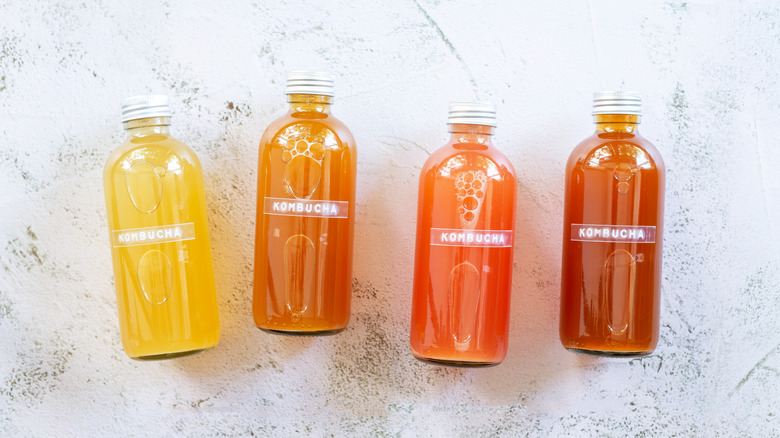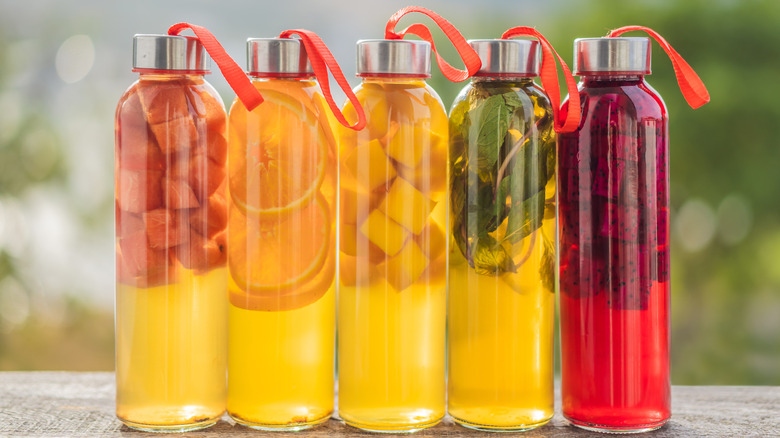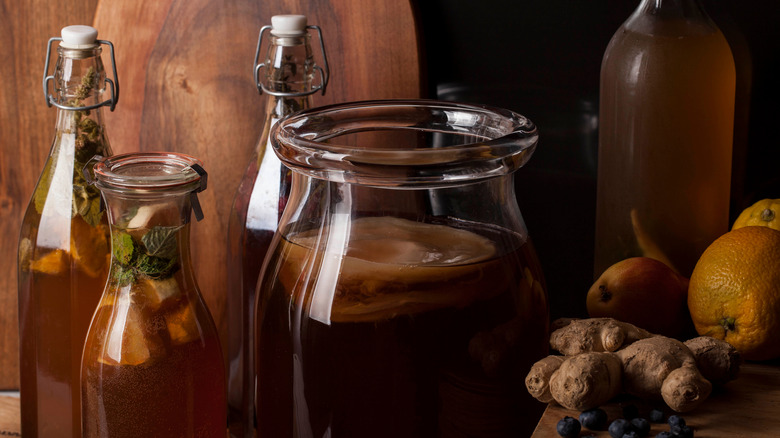Everything You Need To Know About Kombucha
These days fermented foods are getting a lot of attention for their health benefits. Many health conscious consumers have turned on to the fact that fermented foods like kefir, kimchi, and sauerkraut, help maintain a balance in the digestive system and play an essential role in gut health.
Kombucha is a fermented tea that you may have seen on the shelves at your supermarket or mixed with spirits in a trendy cocktail. You may have wondered what this drink is and why it is everywhere. And kombucha is everywhere these days, from juice bars touting the latest health drink to nightclubs using it in fancy cocktails with exotic names. This fizzy drink is getting plenty of attention, and consumers can't seem to get enough of this new tangy beverage. But while kombucha may be new to the U.S. market, it has been around for quite some time.
If you are trying to decide if you should jump on the kombucha trend but aren't sure if it's worth getting too excited about, then read on to learn more. We have gathered everything you need to know about kombucha to help you decide if kombucha is right for you.
What is kombucha?
Kombucha is a fermented sour drink, sometimes referred to as mushroom tea, and is made through a double fermentation process using either black or green tea, along with sugar and yeast. Many commercial kombuchas add fruit for flavoring and to tame the intense flavor. Unflavored kombucha has a sour, acidic taste that is unique and not universally loved. But for many health conscious consumers, the taste of kombucha is tolerated for the health benefits that it provides.
Kombucha has good bacteria or probiotics that have helped elevate its reputation as nothing short of a magic elixir. According to Cleveland Clinic, probiotics are the key to keeping the body in perfect balance and are an integral part of healthy digestion and gut health, and surprisingly gut health and mental health have a strong connection. Psychology Today explains that recent research suggests that a healthy gut is connected to lower levels of depression, anxiety, and overall mental health, which is a great reason to add more probiotics by way of kombucha to your diet. The kombucha market has been growing and is expected to continue growing, making it more than just a one-hit-wonder. Whether you enjoy the tart taste of kombucha or just wash it down for probiotics, kombucha is here to stay.
Where does kombucha come from?
While kombucha started hitting health foods stores in the U.S. in the 1990s, it has been around in other parts of the world for much longer. Unfortunately, it is impossible to know exactly when kombucha was created, but there are a few legends involving emperors from Japan and China being healed by this miraculous new drink. In Tibet, the lore credits an insect that landed on a pot of tea for the creation of kombucha. But they are legends, and while they make great stories that are impossible to verify.
The first time kombucha was actually documented was in a Russian study from the early 20th century and was described as mushroom tea. So kombucha historians have documentation that it was known in Eastern Europe at the beginning of the 20th century and probably before. From there, this fizzy acidic drink spread to other parts of Europe and eventually made its way to the U.S.
As kombucha spread across Europe, so did the rumors about its supposed health benefits, and it grew a cult following. In the mid-1950s in Italy, a popular musician even wrote a song about it. And fervent believers in the power of kombucha were even stealing holy water to mix with kombucha to double its healing powers.
Scoby is key
SCOBY is the key to kombucha. SCOBY is an acronym for Symbiotic Culture of Bacteria and Yeast. It looks like a floppy jellyfish or gelatinous mushroom cap and is the base of kombucha. The SCOBY is where the yeast and bacteria are concentrated and aid the fermentation of sugar into a carbonated alcohol drink.
The same SCOBY can be used in perpetuity as it just keeps growing. Many avid kombucha home brewers share a SCOBY by cutting off a piece to share after each brewing. If properly handled, a SCOBY can last for years of kombucha brewing. However, if inexperienced kombucha makers accidentally contaminate it, the SCOBY can grow mold and become unusable.
After the first fermentation, the SCOBY is removed and either saved to make a new batch of kombucha or shared with friends or family. When the kombucha craze hit Italy, the SCOBY was so prized that superstitious kombucha devotees even had a belief that you couldn't sell or throw out the SCOBY, and if an unfortunate soul did, the result would be bad luck.
Why is kombucha popular?
Kombucha is popular for several reasons. Recently more and more consumers have been looking for healthier alternatives to soda and alcohol, and kombucha is a fizzy drink that can meet that craving for a carbonated beverage. For thirsty consumers watching their waistline, switching from sugary soda to kombucha is an excellent way to cut empty calories. Soda is full of sugar, and drinking those extra calories has a big impact on weight. Of course, kombucha has some sugar, it wouldn't be able to ferment without it, but it has a lot less sugar than soda. But how much sugar depends on the brand. When choosing to give up soda and give kombucha a try, look for one with less sugar.
Another reason kombucha is popular is that influential celebrities like Madonna, Lady Gaga, Gwyneth Paltrow, and Halle Berry have publicly endorsed it. So if consumers aren't drinking it for its health benefits, many are drinking it to be like their favorite celebrities.
Alcohol in kombucha
Due to the fermentation process, kombucha does contain alcohol. Generally, commercialized kombucha has no more than .5% alcohol. But homemade kombucha can vary in how much alcohol it actually contains. Since the U.S. Alcohol and Tobacco Tax and Trade Bureau doesn't regulate products with under .5% alcohol, it's difficult to know the exact amount in certain kombucha brands. In some cases, the bottles of kombucha continue to ferment, raising the level of alcohol. This happened in 2010, and Whole Foods pulled their kombucha products from the shelves. Kombucha manufacturers had to reassess how to keep the drink from over-fermenting and crossing that .5% alcohol line.
Compared to a bottle of beer that has between 4-5% alcohol and a glass of red wine that has roughly 12% alcohol, kombucha's under .5% seems low enough to be safe to drink for everybody. Unfortunately, that is not the case, and many in the recovery community believe that kombucha has enough alcohol to interfere with recovery and a sober lifestyle. However, others in the community embrace kombucha as harmless. Ultimately the decision on whether a person in recovery should avoid kombucha is a personal one.
However, if someone is abstaining from alcohol due to liver toxicity, Medical News Daily recommends avoiding kombucha altogether, especially home-brewed kombucha, which can have a higher alcohol level and affect the already damaged liver.
Commercialized bottled kombucha
Kombucha is big business. As a result, it is no longer just available at small health food stores or brewed in basements. There are many different companies that make kombucha with more flavors than traditional kombucha. The kombucha business is expected to grow to $4 billion in 2024 as more consumers are turning away from sugary sodas and alcohol and reaching for kombucha (via Food Navigator USA).
Big companies like Pepsi are starting to see kombucha as a real player in the beverage industry, and in 2016, Pepsi acquired KeVita, a popular kombucha and probiotic drink maker. Now with a big company like Pepsi giving the kombucha industry some credibility in the health and wellness market, consumers can expect to see continued innovation in kombucha drinks. So if you were already on board with kombucha, you can expect more people to jump on the bandwagon as kombucha is set to go mainstream. For those not on board with kombucha don't be surprised if you start seeing more targeted ad campaigns by companies looking at ways to get hesitant consumers interested in this tart beverage.
How to make kombucha at home
Before kombucha hit the grocery aisles, it was made at home. It is fairly easy to make in terms of special equipment. All you need is a pitcher, a large mouth jar for fermenting, tea, sugar, and of course, a SCOBY. Nowadays, you can find kombucha kits, including a SCOBY, online or in specialty stores. Or if you have a friend that makes kombucha, you can ask for a piece of SCOBY to start making kombucha at home.
However, there are pros and cons to making kombucha at home. The good part of making kombucha at home is you can control the process and the fermentation time in order to control the alcohol percentage. And you can customize your home-brewed concoction to your personal taste by adding your own flavors during the second fermentation.
The negative of home-brewed kombucha is that it is a delicate and precise process that requires a sanitized space. Kombucha home brewers need to pay special attention to detail and keep a sterile environment for making kombucha. While the process on paper seems fairly simple, there is actually a lot that can go wrong during the home brewing process. For example, unwanted bacteria and mold can grow. And if you are using ceramic pots for fermentation, the acidic beverage can leach out toxins from the glaze, and instead of creating a healthy probiotic drink, you have created a toxic home brew.
Different types of kombucha
Now that the market is becoming saturated with kombucha producers and the business of selling kombucha is expected to grow, there are some new forms of kombucha with a variety of interesting flavors like hibiscus and lemon ginger. Surprisingly, sugar free kombucha is also available. Plus, kombucha makers have introduced hard kombucha.
Hard kombucha is a kombucha that has more sugar and has fermented longer to have higher alcohol content. Of course, the higher alcohol content may have anywhere between 3.5 % and 5.5 % making them alcoholic beverages. Hard kombucha loses some of its health benefits due to the higher alcohol content and fewer probiotics. However, when compared to beer with a similar level of alcohol, hard kombucha is still a good choice as it has less sugar and calories than beer. Some hard kombuchas are also gluten-free, making them ideal for those living a gluten-free lifestyle that miss a cold beer.
Established brewery Sierra Nevada has even created their own line of hard kombucha alongside their craft beer. And hard kombucha is expected to hold its own against hard seltzer for those who like a healthier buzz.
Health benefits of kombucha
Kombucha is credited with a host of fantastic health benefits, from aiding digestion and weight loss to boosting the immune system, but how much research actually supports these claims? It is difficult to determine as kombucha's extensive health benefits are still being uncovered but here is what we do know.
Kombucha at its base is tea, either green or black tea, and green tea is one of the healthiest beverages around. Cleveland Clinic explains that both green and black tea have polyphenols, which are antioxidants that support a healthy body and act as an anti-inflammatory that helps combat skin damage and free radicals. Plus, kombucha is fermented, and the fermentation process increases polyphenols, so drinking a glass of kombucha gives you more of a good thing. As a result, getting more tea in your diet is an excellent choice. But it's not quite a fast-acting fountain of youth. The truth is that there isn't enough research and hard facts about kombucha that support all of the incredible health benefits of kombucha, at least not yet.
Risks of consuming kombucha
If you are considering adding kombucha to your diet, then you should be aware of a few things. The first is that the CDC recommends only consuming 4 ounces of kombucha per day. Overconsuming kombucha can have side effects like gas, bloating, and digestive tract irritation. Kombucha has caffeine, and for those sensitive to caffeine, kombucha may prove to be too much.
Another thing to consider is sugar; while kombucha has less sugar than carbonated sodas, it still has sugar, and the sugar combined with the acid in kombucha damages your teeth. Acidic beverages damage the enamel on teeth and cause tooth erosion. So if cavities and oral health are a concern, limit your intake of kombucha to keep those pearly whites bright.
While kombucha is safe for most consumers, there are certain groups of people who should avoid kombucha. Pregnant or nursing mothers should avoid kombucha mainly because it is unpasteurized and contains caffeine and alcohol. And people with weakened immune systems should avoid it, too, because kombucha has live bacteria and yeast, which can lead to bacteria overgrowth that may be fine for a properly functioning immune system but cause problems for a weakened immune system.
